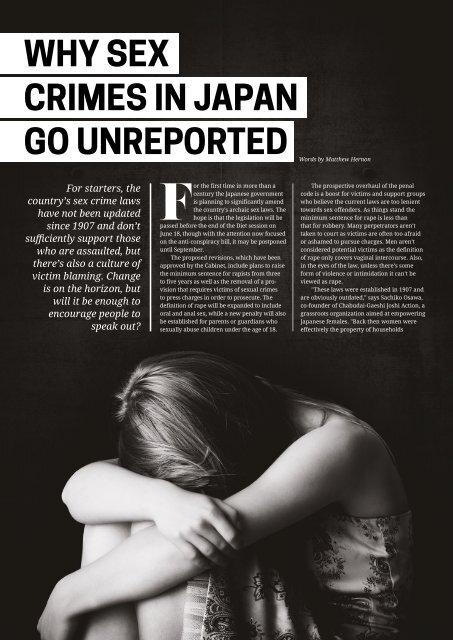Tokyo Weekender - June 2017
Tokyo’s old soul is alive and well. This month, we discover its essence in a retro shotengai, explore its renaissance in modern Japan, and find it in everyday moments on the city streets. Plus: Japan's Archaic Sex Crime Laws Are Finally Changing, Secret Gardens in Tokyo, and Is North Korea a Real Threat?
Tokyo’s old soul is alive and well. This month, we discover its essence in a retro shotengai, explore its renaissance in modern Japan, and find it in everyday moments on the city streets. Plus: Japan's Archaic Sex Crime Laws Are Finally Changing, Secret Gardens in Tokyo, and Is North Korea a Real Threat?
You also want an ePaper? Increase the reach of your titles
YUMPU automatically turns print PDFs into web optimized ePapers that Google loves.
WHY SEX<br />
CRIMES IN JAPAN<br />
GO UNREPORTED<br />
Words by Matthew Hernon<br />
For starters, the<br />
country’s sex crime laws<br />
have not been updated<br />
since 1907 and don’t<br />
sufficiently support those<br />
who are assaulted, but<br />
there’s also a culture of<br />
victim blaming. Change<br />
is on the horizon, but<br />
will it be enough to<br />
encourage people to<br />
speak out?<br />
For the first time in more than a<br />
century the Japanese government<br />
is planning to significantly amend<br />
the country's archaic sex laws. The<br />
hope is that the legislation will be<br />
passed before the end of the Diet session on<br />
<strong>June</strong> 18, though with the attention now focused<br />
on the anti-conspiracy bill, it may be postponed<br />
until September.<br />
The proposed revisions, which have been<br />
approved by the Cabinet, include plans to raise<br />
the minimum sentence for rapists from three<br />
to five years as well as the removal of a provision<br />
that requires victims of sexual crimes<br />
to press charges in order to prosecute. The<br />
definition of rape will be expanded to include<br />
oral and anal sex, while a new penalty will also<br />
be established for parents or guardians who<br />
sexually abuse children under the age of 18.<br />
The prospective overhaul of the penal<br />
code is a boost for victims and support groups<br />
who believe the current laws are too lenient<br />
towards sex offenders. As things stand the<br />
minimum sentence for rape is less than<br />
that for robbery. Many perpetrators aren't<br />
taken to court as victims are often too afraid<br />
or ashamed to pursue charges. Men aren’t<br />
considered potential victims as the definition<br />
of rape only covers vaginal intercourse. Also,<br />
in the eyes of the law, unless there’s some<br />
form of violence or intimidation it can't be<br />
viewed as rape.<br />
"These laws were established in 1907 and<br />
are obviously outdated," says Sachiko Osawa,<br />
co-founder of Chabudai-Gaeshi Joshi Action, a<br />
grassroots organization aimed at empowering<br />
Japanese females. "Back then women were<br />
effectively the property of households<br />
26 | JUNE <strong>2017</strong> | TOKYO WEEKENDER
















